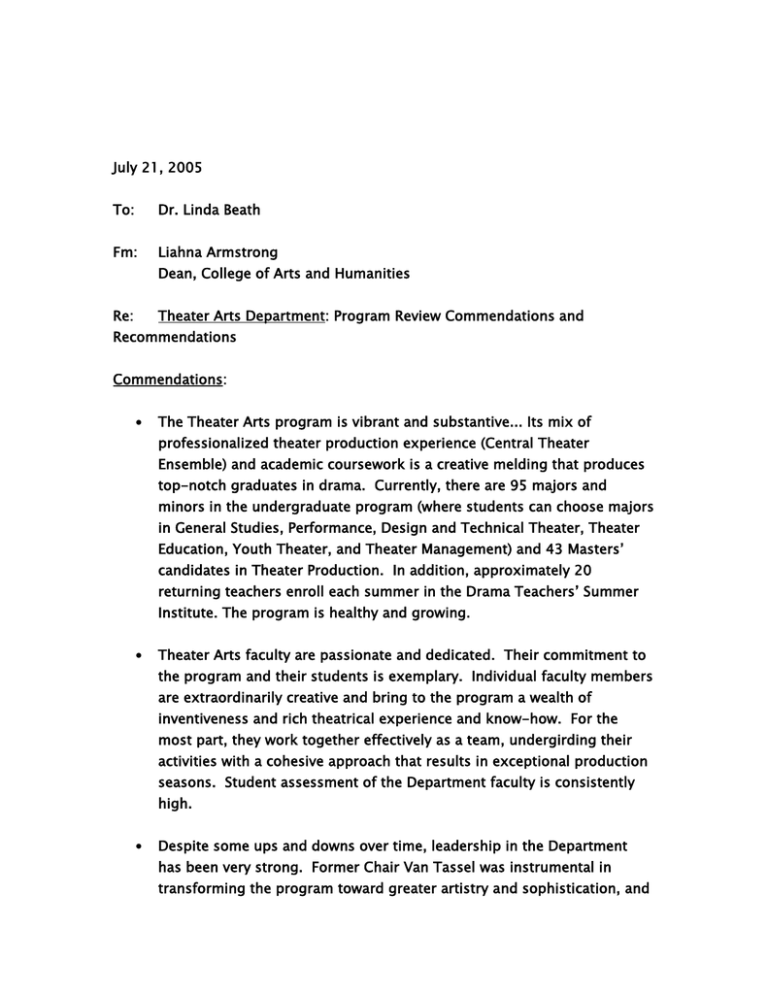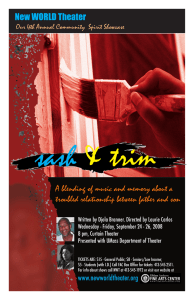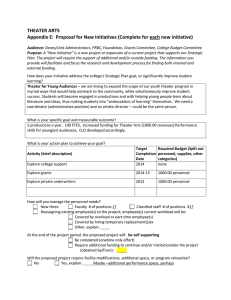July 21, 2005 To: Dr. Linda Beath
advertisement

July 21, 2005 To: Dr. Linda Beath Fm: Liahna Armstrong Dean, College of Arts and Humanities Re: Theater Arts Department: Program Review Commendations and Recommendations Commendations: The Theater Arts program is vibrant and substantive... Its mix of professionalized theater production experience (Central Theater Ensemble) and academic coursework is a creative melding that produces top-notch graduates in drama. Currently, there are 95 majors and minors in the undergraduate program (where students can choose majors in General Studies, Performance, Design and Technical Theater, Theater Education, Youth Theater, and Theater Management) and 43 Masters’ candidates in Theater Production. In addition, approximately 20 returning teachers enroll each summer in the Drama Teachers’ Summer Institute. The program is healthy and growing. Theater Arts faculty are passionate and dedicated. Their commitment to the program and their students is exemplary. Individual faculty members are extraordinarily creative and bring to the program a wealth of inventiveness and rich theatrical experience and know-how. For the most part, they work together effectively as a team, undergirding their activities with a cohesive approach that results in exceptional production seasons. Student assessment of the Department faculty is consistently high. Despite some ups and downs over time, leadership in the Department has been very strong. Former Chair Van Tassel was instrumental in transforming the program toward greater artistry and sophistication, and integrated professional production experience into the curriculum. Former Chair Brenda Hubbard brought an excellent organizational and fiscal aptitude to the management of the program. Former Chair George Bellah built on the strengths of his predecessors and helped steady the Department through difficult personnel issues ably. Current Chair Scott Robinson already demonstrates that he has the managerial and budgetary skills to oversee the Department, along with a creative approach to problem solving and deft diplomacy. Notwithstanding its heavy demands on the faculty, the graduate program and Summer Institute for teachers represent unique and outstanding educational offerings. The outside evaluator aptly called the program “the golden ball and chain,” because it provides abundant opportunities and gratifications, even while it entails both programmatic and personal costs. The virtues of this program, however, clearly outweigh the drawbacks. Since the Summer Institute was established, over 500 teachers from around the region and the country have participated. Theater Arts faculty are superior teachers and mentors of their graduate students. Thesis oversight and supervision is particularly outstanding. Special kudos must go to Leslee Caul, Director of Sales and Marketing. The quality of the Department’s marketing and publicity materials is peerless. The set of brochures, annual production calendars, posters, postcards, and other visual materials publicizing the program and individual programs is well-written and visually arresting. They are a source of pride for our institution, and have marked us as the program to be reckoned with among our regional peers. Ms. Caul’s participation in grant writing, program planning, the Children’s Tour, and in advancing the program is invaluable. In the technical and design areas (stagecraft, costume, lighting) Theater Arts excels. Faculty, staff, and students produce top flight production designs consistently, and do so with limited resources and busy schedules. The Department’s active involvement in the Kennedy Center American College Theater Festival, regionally and nationally, is commendable and has strengthened the program’s quality and visibility. The Children’s Tour is one of the Department’s “gems” and is the only one of its kind in the Pacific Northwest. This year, grant support from Sterling Savings Bank, helped enrich and disseminate the Tour to rural areas. The Department is to be congratulated on taking the initiative and obtaining the grant. The Department is forward thinking, looking to strengthen and diversify its programs, incorporate dance and musical theater, offer a BFA degree, and seek NASTE accreditation. With its strong leadership and the dedicated energy of the faculty, these goals are reachable. Recommendations: The Department needs to take a hard, direct look at its curriculum. This means a holistic review of the program and six major emphases, and a course-by-course assessment of individual course offerings. While I have a sense that as individual students move through the program, their personal curriculum assumes cohesion and the advice they receive from faculty also helps shape their program coherently, nonetheless the catalogue impression of the curriculum lacks a defining core. As the outside evaluator noted, there are way too many “artistic niche” courses, causing several problems. First, the curriculum needs more of a sense of center, a cohesive, integrated programmatic focus rather than, as it seems, a set of disparate offerings. Course offerings are too numerous, content from course to course seems sometimes duplicative, and it is difficult to see how certain courses differ from others (for example, how are T. A. 261, 361, and 461 different? The catalogue descriptions are not sufficiently discrete to clarify the differences, so the courses appear repetitive.) It would be useful to do some paring down of listed courses, thoughtfully combining and streamlining where appropriate. Courses that are rarely offered should be deleted; in cases where courses are holdovers from prior faculty, those should be discontinued. The core courses must be the starting point for coverage, which means faculty must come to agreement what the core is and implement it. This necessitates a collective effort to identify priorities, sharpen the overall curricular objectives of the program, and make some hard choices. Teaching load issues persist. The faculty work very hard—in addition to teaching courses, advising and mentoring, faculty are regularly involved in the labor-intensive efforts of five center-state productions and several supplementary productions a year along with the demanding summer program. As a result, they work very hard and labor under some stress during the academic year. Nevertheless, solutions need to be found to: Prevent the situation, through careful planning and staggering of reassigned time, in which several faculty want to use their accumulated thesis credits at the same during a given academic year, resulting in the diminution of available undergraduate courses. Because the University’s policy and budget practices don’t provide supplemental funds for adjuncts to teach sections that full-time faculty vacate when they use accumulated thesis credits, the academic year program sometimes takes a hit. Enable faculty to leave Ellensburg in the summer to pursue theatrical opportunities elsewhere. As the outside evaluator noted, the scholarly/creative work of the Theater faculty is too tied to oncampus productions. While historically that work has sufficed for tenure and promotion considerations, realistically it is not consistent with professional expectations nationally or in other disciplines at CWU. A rotation system needs to be designed to free up some of the tenured and tenure –track faculty and a funding mechanism devised to support their efforts in other venues. This might take the form of a faculty development fund that helps cover costs during creative leaves so that faculty do not feel compelled to earn summer income through the Summer Institute. It would be useful to provide a formal “budget clinic” for Theater Arts faculty so that some misunderstandings and misimpressions about how the Summer Program is supported fiscally, how salaries are computed in the context of University policies and practices, and what “self support” means could be cleared up. Some perceptions identified by the outside evaluator regarding summer profit are clearly erroneous, and though the Dean’s office has worked with a succession of Chairs to facilitate an understanding of summer finances, misunderstandings by the faculty persist. Certain equipment needs continue to affect the program. I was heartened to see that in spring round of equipment grant applications, Theater Arts fared well as a result of a set of excellent proposals submitted by the T. A. faculty. However, there are still space and equipment needs that should be addressed through University resources. Re-stocking thee lighting inventory is a major priority; the Milo Smith Tower Theater seats need to be replaced. Office space for faculty is at a premium and will become a problem when and if the Department adds staff; classroom space is also at a premium. The University should consider identifying space in either Hertz Hall or the evacuated SUB for additional classroom and rehearsal space for Theater Arts. The future role of Dance in the program needs to be clarified. After early promise, the plan to integrate Dance into Theater Arts hit some road blocks owing to reservations expressed by the P. E. Department and uncertain support from CEPS for the move. It will be incumbent upon the new Dean of CAH to work with the Dean of CEPS and the appropriate department and program chairs to make a final determination about Dance’s role and implement it. Overall, the Theater Arts Department is strong, resilient, and creative, and I concur with the outside evaluator that it seems to be entering a “golden age” and with the proper support and internal decision-making, that time is near.




